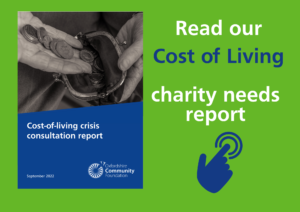We asked our network of charity contacts what the biggest issues are for Oxfordshire communities in the cost-of-living crisis, and what type of activities need funding support. We have used the responses to design a round of funding opening next week.
We received nearly 100 responses to our survey, and 38 people attended our consultative workshop, where we asked the same questions and explored the survey responses. We found that the survey results were reinforced by the workshop discussions.
The priority issues came out as access to food/essentials, debt and benefits, and mental health, and the priority funding areas are mutual aid and food banks; advice and drop-in services; and crisis support. However, the responses and discussion also made the case for a longer-term view, and funding to ensure core activities provided by the local charitable sector are sustainable.
 We have written the survey and workshop up as a report where you can read the full results and a selection of comments from the charitable groups that responded. Testimonials gathered during the consultation paint a picture of great need but also great understanding from the community organisations delivering support on the ground. For example, Vale Community Impact told us: “Hardship is being faced today by those who never before have faced challenges. People are ill-equipped to deal, experiencing extreme confusion and are panic-stricken with anxiety. Those in full time employment, those who own their own homes are not exempt from difficulty and worry.
We have written the survey and workshop up as a report where you can read the full results and a selection of comments from the charitable groups that responded. Testimonials gathered during the consultation paint a picture of great need but also great understanding from the community organisations delivering support on the ground. For example, Vale Community Impact told us: “Hardship is being faced today by those who never before have faced challenges. People are ill-equipped to deal, experiencing extreme confusion and are panic-stricken with anxiety. Those in full time employment, those who own their own homes are not exempt from difficulty and worry.
“One-off or even a short series of urgent crisis shops/energy top-ups are not the answer but a brief moment of relief. Efforts need to focus on the bigger picture, re-education and case work to tackle the deeper issues and assist the clients with real and relevant decisions to make these times of extreme hardships more bearable. Tailored where necessary for the client’s specific circumstance.”
Our report’s conclusions are:
- The needs of communities persist and have increased – charities and community groups are seeing a huge increase in demand, from existing users with more or deepened issues, as well as new users of their services. This demand is far beyond what they saw during the pandemic. There is a genuine fear from the community as to how they will cope.
- Cost-of-living issues are multiple and inter-related – crisis support funding is vital to meet the demand for essentials – food, heating, clothing – together with practical support and guidance. The community needs and wants to know where to go and what help is available across a range of concerns.
- Super local community hubs are needed – services need to be close by and delivered by trusted organisations. This means widening the services offered (delivering community activities and food and practical advice) or utilising a partnership of organisations within an existing community hub.
- More complex issues and preventative solutions will take longer to resolve – local charitable organisations have the experience to support their communities, but not necessarily the right ‘toolbox’. Offering more personal support or fixing the source of a problem, rather than offering a sticking plaster solution, takes more time and resources. However, this future-proof approach will provide greater benefits to the community overall.
- Charities need investment to continue – at a time when they need to offer heavily discounted or free services, their own costs are rising, there are fewer volunteers (as they have gone back to work or are unable to now offer support), and the salaried roles charities can afford are not attractive or competitive.
- Charitable organisations need support to promote their services – to ensure they are reaching all those who need their services, but also so that the organisations themselves are aware of all the support on offer and can signpost confidently.
These conclusions have informed the grant criteria and amounts available for a round of cost-of-living funding that will open next week. We will publish details on our grants page and by email to our contacts in the sector (opt in here).
We are also appealing to our donors and the general public to donate to our Cost of Living Fund, to make more support available to our dynamic and hardworking charitable sector during this time of crisis.

